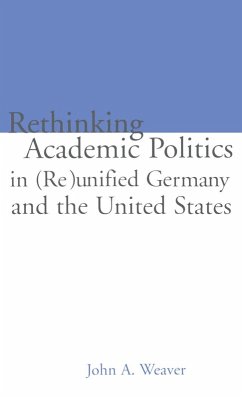In Rethinking Academic Politics in (Re)Unified Germany andthe United States, Dr. John Weaver uses case studies to engage historical and contemporary issues in academic politics, arguing for the importance of this often-dismissed and much-bemoaned facet of academic work. Dr. Weaver's unique treatment includes discussions of such hotly debated issues as the Enola Gay exhibit, the science debates in the U.S., and the politics of academic evaluations and hiring practices. Rethinking Academic Politics in (Re)Unified Germany and the United States speaks to the interests of students and scholars of international and comparative education, higher education policy and practice, cultural studies, and science studies.
Dieser Download kann aus rechtlichen Gründen nur mit Rechnungsadresse in A, B, BG, CY, CZ, D, DK, EW, E, FIN, F, GR, HR, H, IRL, I, LT, L, LR, M, NL, PL, P, R, S, SLO, SK ausgeliefert werden.

